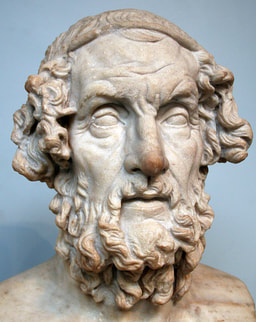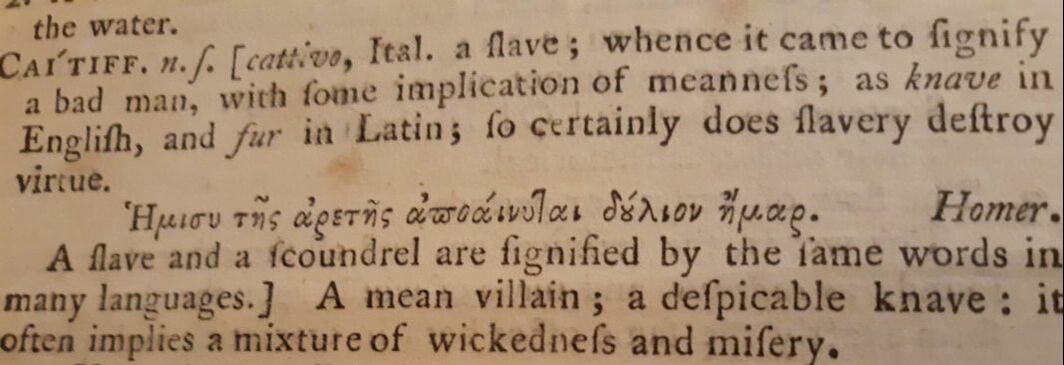
Authority Cited: Homer
Author name and dates: Homer (fl. 850 BCE)
BKG Bio-tweet: Iliad and Odyssey Greek poems attributed to Homer; SJ: Homer epics superior to Milton because composed first
Categories (list of works cited – preliminary) [BKG Working Note: only one Dict. citation is to Homer by name. Other Homer Greek quotations include one from the Odyssey under the headword grubstreet. The source for SJ's Greek quotations of Homer is unknown. Several titles are listed in Samuel Johnson's Library, An Annotated Guide, Donald Greene, 1975 from the Sale Catalogue of Samuel Johnson's Library, A Facsimile Edition, Fleeman, ed.: 478 2. Homeri Ilias, Eustathii, Rom. 1542, &c.; 292 2. Homeri Olias Didymi, Cant. 1689; 416 2. Homeri Ilias & Odysseae, Dydymi. Cant. 1687 &c.; 202 Homeri Ilias & Odyssea, opera, & studio I. Barnes Cant. 1711; 623 26 [sic], Homeri Ilias et Odyssea, 2 tom. a Clarke. Amst. 1743, and 2 more; 434 Homeri Ilias, Graec. & Lat. S. Clarke Lond. 1758; 498 4 Homerus Didymi, &c.; 410 4. Homeri Gnomologia. Cant. 1660, &c.]
Homer (no work cited); caitiff [BKG Note: see image below for SJ's Greek quotation from The Odyssey and translation (which is given in the etymology discussion before the Greek). The following was kindly provided by Prof. Stephen E. Hinds of the University of Washington, Seattle, Classics Department.
The passage is from Odyssey, Book 17, a scene in which the swineherd Eumaeus is telling the disguised Odysseus (whom he does not yet recognize) that everything in Ithaca has been neglected by the servants in the long absence of the master — including Odysseus’ faithful dog. Johnson more or less quotes verse 322, except that he replaces the last two words (= far-sounding Zeus) with two words from the second half of verse 323 (= 'the day of slavery’), and produces, in effect, a shorter one-verse version of the thought in the two Homeric verses. So, as written by Johnson, the words translate as ‘the day of slavery takes away (or ‘destroys’) half one's worth (or ‘virtue’)’. The Johnson paragraph that immediately precedes the Greek quotation is an English paraphrase of its thought.]
Author name and dates: Homer (fl. 850 BCE)
BKG Bio-tweet: Iliad and Odyssey Greek poems attributed to Homer; SJ: Homer epics superior to Milton because composed first
Categories (list of works cited – preliminary) [BKG Working Note: only one Dict. citation is to Homer by name. Other Homer Greek quotations include one from the Odyssey under the headword grubstreet. The source for SJ's Greek quotations of Homer is unknown. Several titles are listed in Samuel Johnson's Library, An Annotated Guide, Donald Greene, 1975 from the Sale Catalogue of Samuel Johnson's Library, A Facsimile Edition, Fleeman, ed.: 478 2. Homeri Ilias, Eustathii, Rom. 1542, &c.; 292 2. Homeri Olias Didymi, Cant. 1689; 416 2. Homeri Ilias & Odysseae, Dydymi. Cant. 1687 &c.; 202 Homeri Ilias & Odyssea, opera, & studio I. Barnes Cant. 1711; 623 26 [sic], Homeri Ilias et Odyssea, 2 tom. a Clarke. Amst. 1743, and 2 more; 434 Homeri Ilias, Graec. & Lat. S. Clarke Lond. 1758; 498 4 Homerus Didymi, &c.; 410 4. Homeri Gnomologia. Cant. 1660, &c.]
Homer (no work cited); caitiff [BKG Note: see image below for SJ's Greek quotation from The Odyssey and translation (which is given in the etymology discussion before the Greek). The following was kindly provided by Prof. Stephen E. Hinds of the University of Washington, Seattle, Classics Department.
The passage is from Odyssey, Book 17, a scene in which the swineherd Eumaeus is telling the disguised Odysseus (whom he does not yet recognize) that everything in Ithaca has been neglected by the servants in the long absence of the master — including Odysseus’ faithful dog. Johnson more or less quotes verse 322, except that he replaces the last two words (= far-sounding Zeus) with two words from the second half of verse 323 (= 'the day of slavery’), and produces, in effect, a shorter one-verse version of the thought in the two Homeric verses. So, as written by Johnson, the words translate as ‘the day of slavery takes away (or ‘destroys’) half one's worth (or ‘virtue’)’. The Johnson paragraph that immediately precedes the Greek quotation is an English paraphrase of its thought.]
